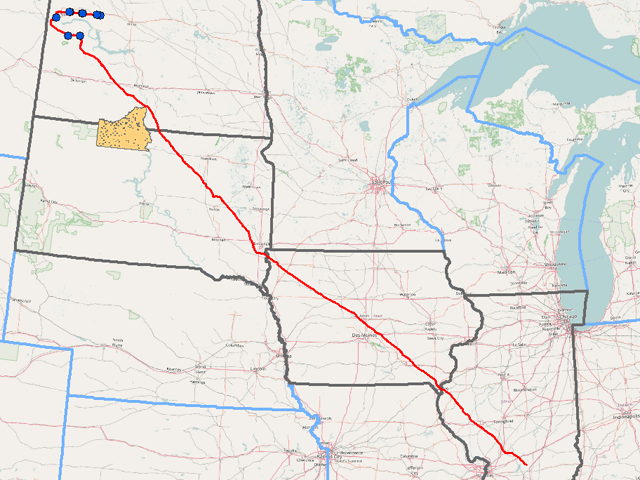Pipeline to Remain Open
Judge Rules Dakota Access Pipeline Can Remain Open During Corps' Environmental Review
LINCOLN, Neb. (DTN) -- The Dakota Access pipeline will continue to operate while the U.S. Army Corps of Engineers conducts an environmental review, a federal judge ruled Friday.
The U.S. District Court for the District of Columbia said although the pipeline is operating without a federal permit after a previous court ruling, the plaintiffs in the case didn't meet the legal burden to prove leaving the pipeline open during a review would be harmful.
"Those tribes thus find themselves forced to return to this court to seek what they have so far been unable to obtain from the government: an order halting pipeline operations until the Corps completes its new EIS (environmental impact statement)," the court said in its ruling.
"Before the court may grant them such relief, however, binding caselaw requires that the Tribes make an evidentiary showing far beyond anything the Corps needs to itself shut down DAPL. As previously mentioned, they must demonstrate a likelihood of irreparable injury from the action they seek to enjoin. For the reasons articulated in this opinion, plaintiffs have not cleared that daunting hurdle. Here, the law is clear, and it instructs that the court deny plaintiffs' request for an injunction."
Back in January, the U.S. Court of Appeals for the District of Columbia Circuit ruled Dakota Access violated the law by conducting work on the pipeline without an easement.
Rep. Kelly Armstrong, R-N.D., said in a statement on Friday the court made the right decision.
P[L1] D[0x0] M[300x250] OOP[F] ADUNIT[] T[]
"DAPL has been safely transporting oil from North Dakota for nearly four years and should be allowed to continue," Armstrong said.
"Pipelines are the safest way to transport oil and gas, and the DAPL provides thousands of jobs and millions in tax revenue that our state and the Mandan, Hidatsa, and Arikara Nation rely on to provide services."
In April, Dakota Access asked the appeals court for an en banc hearing, arguing the U.S. Army Corps of Engineers had conducted an environmental review, although the court ruled otherwise.
The state of North Dakota recently filed a motion to intervene in the case. The state argued if agriculture has to compete for railway and truck service, agriculture will face "intractable railroad congestion, rotting grain, higher food prices, and ultimately, a potential for food shortages."
The Dakota Access pipeline was constructed underneath Lake Oahe, which was created when the Corps flooded thousands of acres of Sioux lands in the Dakotas by constructing the Oahe Dam on the Missouri River.
The lake provides several successor tribes of the Great Sioux Nation with water for drinking, industry, and sacred cultural practices. According to the Mineral Leasing Act, the pipeline could not traverse the federally owned land at the Oahe crossing site without an easement from the Corps.
In December 2020, 14 states alleged in a brief that the closing of the pipeline could hurt agricultural economies in the Midwest because of expected cost increases to ship grain.
In an amicus brief filed with the court, the states of Indiana, Montana, Iowa, Kansas, Kentucky, Louisiana, Missouri, Nebraska, Ohio, South Carolina, South Dakota, Utah, West Virginia and Wyoming sided with agriculture interests, the pipeline company and the Corps of Engineers.
From April 2016 to February 2017, Native American and other groups protested the construction of the pipeline running from the Bakken oil fields in western North Dakota and crossing the Missouri and Mississippi rivers to southern Illinois.
Part of the pipeline runs near the Standing Rock Indian Reservation. Protests centered on concerns about the pipeline's effect on water supplies used for irrigation, drinking water and threats to ancient burial grounds.
The appeals court ruled the Corps violated environmental law in 2017 when it allowed the pipeline owner, Energy Transfer, to build beneath South Dakota's Lake Oahe.
Todd Neeley can be reached at todd.neeley@dtn.com
Follow him on Twitter @DTNeeley
(c) Copyright 2021 DTN, LLC. All rights reserved.




